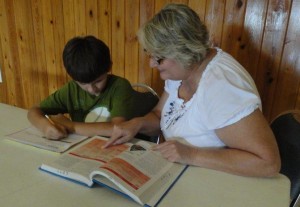Normal
0
false
false
false
EN-US
X-NONE
X-NONE
/* Style Definitions */
table.MsoNormalTable
{mso-style-name:”Table Normal”;
mso-tstyle-rowband-size:0;
mso-tstyle-colband-size:0;
mso-style-noshow:yes;
mso-style-priority:99;
mso-style-parent:””;
mso-padding-alt:0in 5.4pt 0in 5.4pt;
mso-para-margin:0in;
mso-para-margin-bottom:.0001pt;
mso-pagination:widow-orphan;
font-size:11.0pt;
font-family:”Calibri”,”sans-serif”;
mso-ascii-font-family:Calibri;
mso-ascii-theme-font:minor-latin;
mso-hansi-font-family:Calibri;
mso-hansi-theme-font:minor-latin;}
Some children dread the thought of doing homework. They may leave an assignment for the last minute or refuse to do it all together. Many parents handle this by trying to force their children to do their homework. However, getting into a power struggle with your child is not effective. By having clear rules and expectations, you can create a positive situation for both you and your child.
Meaningful homework can help students do better in school, especially as they get into the upper grades. Homework teaches children responsibility, as well as how to follow directions, manage time, begin and complete a task, work on their own, and practice what they’re learning in class. However, most children would much rather be playing or doing other things than homework. Many parents and children struggle over when, where, and how homework will be done.
At times, parents may feel that it would be easier just to do the work for their children. However, the National Parent and Teacher Association advises parents to let children do homework themselves. You may need to sit with elementary-school-age children and walk them through the process of how to study, help them organize the materials they need, and make sure they’ve completed all their tasks. As you do this, you are laying the foundation for good study habits.
Parents can offer to help check homework, but helping is very different from taking over. You also can reinforce good habits by helping your child find a regular place to work and a regular time of day to do homework. Instead of asking if your child has homework every night, always assume that there is homework, reading, or studying of some kind to be done.
Here are some tips on things you can do to help your children with homework:
- Have a set time for your child to do homework.
- Get the whole family involved by setting a regular family quiet time for working. Provide your child with a comfortable and well-lit place where they can do homework, such as a desk or a kitchen table with a chair. Minimize distractions by turning off the TV and making video games off-limits during quiet time.
- Make sure your child has pens, pencils, notebook paper, and any other supplies. Know where to direct your child to get information they may need, such as a school, a website, other children in the class, or a teacher’s help before or after school.
- Think of yourself as a coach to your children, providing assistance on what to do next if they get stuck, checking over their work when they are finished, or even helping them practice testing themselves on new skills. Showing interest in their work and encouraging their efforts can be a boost for your children and help them find greater success in school.
- Avoid constantly nagging or lecturing your child to do homework. If your child is continuously frustrated by or unable to complete assignments, visit your child’s teacher. Discuss ideas to work out possible strategies to help your child succeed.
For further information, go to EDIS.IFAS.UFL.EDU.
Sources: FAR1718 Helping Children with Homework, Heidi Liss Radunovich; FCS2203 Parenting During the Elementary School Years, Part 2: Discipline, Millie Ferrer-Chancy, Ingrid Rivera and Anne M. Fugate.
- Youth Gain from Camping Experiences - May 13, 2015
- The Importance of Club Involvement - May 1, 2015
- Helping Young Children Understand the Meaning of Math - June 2, 2014

